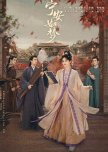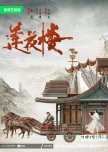
How a leader of men becomes a follower of a woman.
Li Ni is too good to be true: a brave, patriotic, upstanding and brilliant young general who safeguards the border at the kingdom's farthest reaches with his Zhenxi army. He aspires to live a carefree, adventurous life at his beloved Laolan Pass with his found family of merry men, steering clear of his imperial roots. And no wonder; his royal father and two half-brothers are cowardly, venal, ambitious, duplicitous and so dumb they test the limits of the word. But destiny intervenes when a military governor Sun Jing seizes the capital, holds Li Ni's witless father hostage and the imperial grandson and rightful successor goes missing. As the kingdom descends into civil war, Li Ni leads the intrepid Zhenxi army to try to save the day. He encounters the bold and audacious A Ying, a lieutenant at the helm of the formidable Cui family army. At first glance, A'Ying is an awesome character; strong, independent, daring, ambitious and cunning. While they have different visions of the future, they are aligned in the immediate purpose of defeating Sun Jing. They join hands in an alliance that has each trying to out do the other in terms of being the one to seize victory. Sparks fly between them, suggesting a broader and more permanent union could be in the cards.The political plot is very loosely based on the history of the founding of the Tang dynasty. The writing reflects a shallow understanding of politics and historical reality and just plain laziness. The writer clearly didn't know what to do with the one interesting and smart villain and thus quickly kills them off. We are then bamboozled with a bunch of very tired one-note villain archetypes who are surprisingly difficult to kill dead despite their limited brain cells. They are so done before too many times villains that they are not worthy of mention. The only good thing about the battle for the throne arcs are the action scenes; they are exciting and bloody. Xu Kai always delivers incredibly agile and powerful fight scenes and with a good action director like this, he really shines. The drama peaks at an epic and consequential battle around episode 32 and that is probably the best place to stop. It took me a long time to get through the final 8 episodes that were unnecessary and as bland as tofu.
In terms of the romance, this drama is anchored by good chemistry and flawless portrayals by Xu Kai and Jing Tian. It errs on the side of being overly generous with the fan service sweet scenes, which I only mildly enjoyed. I may have been more convinced had I not just come off watchingJing Tian beam beatifically up at Feng Shaofeng (Legend of Zhuohua) with that exact same limpid, adoring expressions. The bigger issue is that A Ying as a character is incredibly difficult to like. She is strong willed, reckless and has a most unbecoming need to win all the time and especially when she is wrong. She doesn't even "win" with any great, glorious or brilliant schemes; her kisses are essentially Kryptonite as far as Li Ni is concerned. It is beyond infantile that he would cede an entire city for a kiss! Li Ni's wants are mallaeble as far as she is concerned and she takes it upon herself to meddle in high power politics to achieve the outcomes she wants. When she doesn't like the consequences of her schemes, it is inevitably Li Ni's fault. The "dealbreaker" conflict between them never gets solved; their relationship is bailed out by events, which is an anti-climatic writing cop out that left me convinced they will surely end up divorced. She does not communicate with Li Ni, overestimates her ability to handle problems on her own and is oblivious to the fact that a deranged lunatic is after her even though he captures her many times. To my dismay, each of her near death experiences are just near. We are told this is a smart and independent character but we are shown she is not smart and constantly needs rescuing from her own hubris. Their love story is an utterly soul destroying tale of how a leader of men becomes a follower of a woman. The only love story in this drama that actually moved me was that of Consort Xiao.
This is Xu Kai's best recent drama after a string of disappointments and he does a really good job here playing a character with massive hero complex. As for Jing Tian, I didn't love her character but I am sure a less charming actress would have frustrated me into dropping this. Despite the good acting, the many logic holes, pedestrian sub-plots and cardboard characters make for a smooth but bland cocktail. I can only rate it 7.0. Overall it is not a bad watch for the fantastic fight scenes and squeal-worthy flirty moments.
Was this review helpful to you?

May the baddest man win.
This is the drama adaptation of a popular female harem web novel "Kun Ning" (坤宁) by Shi Jing (时镜) with an interesting approach; readers voted on who the female protagonist ends up with. It is a dark and gripping tale of intrigue, conceit, betrayal, revenge and redemption. Jiang Xuening is the alluring but resentful, selfish and ambitious daughter of a court official who ruthlessly parleys her charm and cunning into becoming empress. Her schemes lead to the downfall of the royal family and the ruin of both her childhood sweetheart Yan Lin and the erstwhile incorruptible Zhang Zhe. Desperate and full of regret, she barters her life with the blackbellied Xie Wei to save Zhang Zhe. She finds herself reborn as her 18-year old self with a chance for a do-over. She vows to do better this time, to steer clear of the bastions of power and the malevolent Xie Wei. She tries to use her preternatural knowledge to save Yan Lin and Zhang Zhe from their sad fortune. As she embarks on a journey of atonement, she discovers there is an element of destiny that pulls her towards the center of power. This time, with greater wisdom and insight, she uncovers hidden secrets and unexpected allies that help her better grasp the intrigue unfolding around her. Is that enough to change their destinies or are they doomed to the same tragic fate?This story explores the causal links between the past, the present and the future.; the idea that if only knowing what we know now, we can go back and do what we should have, could have but did not do. It begins with a Ning'er who is already a fully realised character that is not yet revealed; a charming beauty who had the world at her feet and lived a wicked and self-indulgent life. Even though Ning'er's goals change, her innate nature stays the same. The past is told in flashbacks just before the moment plays out again in the present. This works in terms of the more detailed plot points but dilutes the character and relationship stories. Thus while Bai Lu pulls off her role well overall, the piecemeal telling of the backstory doesn't capture the depth of Ning'er's regret or the layers in her relationships with some of the main characters.
Where the storytelling falls short is in Zhang Zhe's arc. To me, it is the most pivotal love story in the drama. He was the best of men, a morally upright official who betrayed his principles for her. And she was a selfish person who was so moved she became selfless for him. Their emotions were so powerful it pushed them both outside of themselves towards a mutually destructive outcome. Sadly unlike the novel, their do-over relationship is shallow and barely scratches the surface of the unfinished affinity between them. It's a pity that instead sticking to the novel which better fleshes out this arc they wasted a bunch of time on the nasty Consort Shu's boring and tropey petty antics. Wang Xingyue delivers such an empathetic portrayal of Zhang Zhe that I was disappointed his character was short changed by the narrative.
As for Xie Wei, I have a weakness for unapologetic, unspeakably damaged, vengeful and morally ambiguous characters like this. Zhang Linghe delivers an intense portrayal of this dark and complex role. Although he overdoes some of the snarls and sneers, his performance overall deserves praise and is his strongest to date. Every time the full fury of Xie Wei's fiery death glare flashes across the screen, I go weak at the knees and my brain turns to mush. Yups, I am definitely a "may the baddest man win" kind of girl. Xie Wei is far from the best man but they are well matched, morally flexible ends justify means kind of people. Their romance arc only takes off later on but it is worth the wait. A mutual understanding develops gradually between them before things get really hot and steamy. When it does, their audacious chemistry explodes in a way that sets a new bar for passionate kiss scenes going forward.
Even though the political conspiracy is not that complicated, it is well told and riveting. Xie Wei's origins are a bit too obvious early on but I enjoyed how Ning'er and Xie Wei work together to uncover the conspiracy. They are both diabolical in how they manipulate the different factions around like chess pieces. The villains are no pushovers but they are overshadowed by the force of nature that is Xie Wei and Ningér's combined dark ruthlessness. This is not an action heavy drama but all of the fight scenes were well shot. I particularly enjoyed the vicious ferocity and absolute glee with which Yan Lin cuts through a melee. I hope this fight maniac Zhou Junwei's small indiscretion does not stand in the way of future roles in action intensive wuxias. Outside of one unnecessary and infuriatingly gratuitous death, the drama ends on a strong note after a bloody, intense and thrilling showdown.
While I enjoyed this drama immensely, the storytelling left me vaguely dissatisfied; as if I only watched the cliff note version of a story that had a lot more depth, nuance and substance than the drama managed to convey. This director is not great at knowing which plot arcs to give more weight to and has an unfortunate predilection for over-bright spot lights and spinning cameras. The production values are mediocre at best. This is a story that had so much potential it deserved to be in the hands of a better director and a better budget. I still rate this a highly reccomended 8.5/10.0.
Was this review helpful to you?

Confucius' last stand.
This drama is about a conspiracy that unfolds during the latter part of the Wanli reign of Ming dynasty, regarded as one of the most prosperous periods in human history. It was the beginning of the end as Wanli's indifference and administrative dysfunction led directly to the downfall of the Ming dynasty. A series of shocking serial killings in Jiangnan has the local Du County yamen scrambling for answers. Each macabrely staged corpse comes with a quote from the Analects of Confucius, a chilling message from the killer.This is a dark story about just how difficult it is to be a decent person, much less one that lives up to.Confucian standards of morality. In a hierarchical feudal society where a scholar's voice drowns out that of a servant and the justice system takes such long detours that it fails even elite rare talents like Judge Song , many inevitably stray down the slippery path of insidious moral compromise. Most of the characters in this story start out as decent people with relatable goals of wanting to improve their lot in life, to set their one true love free, or to right a wrong. For Qu Sangeng, a young bailiff at the yamen, the killings hit too close to home. Hunting down the killer is personal for him but his investigation is hampered by his low rank and treacherous internal yamen politics. With the help of his friends, he manages to connect the killings to a 20-year old arson case where justice may have been subverted. Like his mentor Captain Leng , Sangeng resorts to somewhat questionable methods against some bad actors over the course of his investigation. He soon discovers that point where the end no longer justifies the means and all too easily that line between justice and vengeance becomes blurred. Will he choose to do what's right or succumb to his own worst instincts?
The narrative alternates between two timelines where Lu Zhi and Qu Sangeng are parallel clever characters who are slightly morally flexible and find themselves privy to secrets. Within their sphere of influence is a strong father figure, a scholarly friend and a simpler one with innately stronger moral conviction. The plot is tight and the dialogue is laced with subtle dark humor that fits well with the serious and suspenseful tone of the story. I really appreciate this as too many productions hire big name comedians with exaggerated delivery styles that are jarringly incompatible with the mood of the story. The humourous mocking of too obvious cross dressing was a 10/10 comedy gold moment for me. Mystery buffs will appreciate how the plot keeps you guessing with credible alternate theories that remain in play into the final reveal. The villains are hidden in plain sight, everyone's actions are in character, there are enough clues along the way, the solution makes sense and the ending surprise twist was long foreshadowed. My only slight criticism is some of the character downfalls occur a bit too abruptly and I think the mastermind did have the means to obtain justice in a different way. Even though the ending is fitting and realistic, none of the truly morally upstanding characters get good outcomes. At least one of the deaths was not deserved and unnecessary.
Ning Li anchors this drama as Song Chen, a dark, tortured character full of remorse; betrayed by the system into betraying himself. His heartbreaking struggle to fight monsters without becoming a monster is like watching Confucius' last stand. This character pays tribute to Tang Yin aka Tang Bohu, a renown Ming Dynasty artists and poet. The young actor Yu Yao makes an impression beyond his age with his nuanced, empathetic and chilling portrayal of the young Lu Zhi. While Qu Sangeng is not Bai Yufan's strongest role, he delivers a credible if at times forced performance. This is a wide cast of superb, non-idol actors who pull off complex and captivating portrayals with limited screen time. The bold decision to film in an ancient city and the stunning cinematographic impact of moss drenched walls and vivid rustic countryside and the authentically styled characters all add to the sense of immersion. The drama's visual composition style conveys a suspenseful ambience, a feeling of subtle decay and an air of injustice that belies the vibrant prosperity of Du County. Overall, a superb debut production by filmmaker and screenwriter Zheng Wang that eschews tired tropes. This is a director that has something to say and he tells a riveting and resonating story about justice and morality that leaves food for thought at the end.
This is one of the best ancient suspense thrillers I have watched in a long time and one that hard core mystery buffs can lose themselves in. A highly recommended 9/10 from me.
Was this review helpful to you?

The boundless promise.
Feng Ren is a Gushi/骨仕, an enigmatic, lethal sworn blade whose sole reason of existence is to protect the coveted Wuliang/无量/Boundless Heart Sutra. He intercepts a blind boy Po Xiao, who may just be a decoy or may be the true custodian of the Wuliang Heart Sutra and together, they flee the city. On their perilous journey they learn each others secrets. Underneath all the half-truths and deceptions between them, an inexplicable bond, an unspoken shared understanding and trust grows between then. For such a short length story, the actors' chemistry and the depth and complexity of emotions they conveyed shook me. Every twist deepens their bond and the boundless promise they make to each other. The important message of this story is that with great power, comes great responsibility. This is dark and heartbreaking wuxia but the break of dawn that pierces the darkness is blinding and immensely powerful.Everything about this movie smacks of Guo Jingming's fabulous taste and hallmark aesthetics. If like me, you watch this after My Journey To You, it is quite clear that the drama expands upon many ideas in terms of style, plot and character design from this 37-minute movie. Feng Ren makes me think of Han Yasi and Po Xiao of Xue Gongzi. The narrative also explores how best to deal with a weapon of unaparallelled power. Due to its short length, the plot is tight with no unnecessary digressions and everything comes to a full circle at the end. It perfectly illustrates the power of a short story in how it captures the heart and the imagination with all that is left unsaid and untold. This is a simple, well executed plot that is a must watch and one that I am happy to rate 8.5/10.
Was this review helpful to you?

Creation of the Gods Ⅰ: Kingdom of Storms
15 people found this review helpful
Sons of a tyrant.
Wuershan's Creation of Gods trilogy is the culmination of an eight year labor of love that is the most ambitious and grand scale adaptation of Chinese classic Investiture of Gods ever. This Homeric, often chaotic tale of gods, demons and men that blends speculative history with myth and legend is probably the most widely adapted ancient Chinese vernacular novel. This grandiouse, exhilarating, action packed, and painstakingly crafted production is a visual triumph and an immersive adventure that is best experienced on an IMAX screen.Kingdom of Storms is the first instalment that focuses on the origin story of the King Zhou of Shang and how he incurred the wrath of the heavens to the extent the gods intervened. In a departure from canon, this adaptation does not lay the moral decay of King Zhou solely at the door of the hedonistic, fox jezebel Su Daji. This version holds King Zhou accountable, clearly asserting that his ambition and moral flexibility already put him on the dark path from the get go. This is a more layered and manipulative King Zhou, who adopts all of his noble hostages including Ji Fa as foster "sons". He ruthlessly indoctrinates his own son Yin Jiao as well as his hostage sons into choosing to be sons of a tyrant over their own fathers. All of the sons are pushed to decide whose son they really are and what kind of man they wish to become. This recurring theme of conflict between father and son and right and wrong adroitly weaves most of the sub-plots together.
Kris Phillips with his magnificent build and his imposing, quietly menacing , almost mesmeric screen aura is impeccably cast as King Zhou. He so much looks and breathes the part that it is easy to ignore his at times bizarre Mandarin and the occasionally stiff acting. Although the stunningly gorgeous Naran is bewitching as Daji, the role lacks complexity. She doesn't get to do much more than alternate between a sensuous seductress and a cunning and feral animal spirit when cornered. This debouched couple lights up the screen with their dark chemistry but I could have done with a bit less of their wanton cavorting that comes off as too unsubtle Hollywood. Beyond their honed physiques and stunning atheleticism, both Yu Shi's Ji Fa and Chen Muchi's Yin Jiao won my heart with their brotherhood and their portrayal of initially bewildered and disillusioned sons who grow up to become fearless and resolved men. They stand out among the dazzling number of up and coming young actors who managed to make an impression in this whirlwind production as does Ci Sha's not so hot headed Yang Jian. The deities don't feature as prominently in this first chapter but I much enjoyed this first glimpse of the diabolically mischevious Nezha.
For those unfamiliar with the chaotic original works, the storytelling may seem cluttered with vignettes at the cost of plot advancement as this largely sets the stage for what culminates in the battle of all battles between good and evil. Beyond an almost gratuitous amount of wildly, intense action scenes, the narrative pays homage to key features of the original works from Ji Chang's meat pies to Bi Gan's seven chamber heart. It culminates in Ji Fa's hair rising escape from the Shang capital Zhaoge. Keep watching after the credits roll as the following epilogue sets up the next instalment where hopefully we see a lot more plot movement. This is a very difficult and messy novel to adapt but so far, I am very impressed with how cogently and fittingly everything ties together. This promises to be the best adaptation by a long mile of this well loved novel, the first part of which warrants a highly enthusiastic 8.5/10.0 from me.
Was this review helpful to you?

Those who seek revenge dig two graves.
This is a heartbreaking and sobering revenge drama about an ancient Me Too movenment by nine commoners seeking justice. The two main protagonists, Rulan and Meng Wan are apprentices at Yanyu Tower, whose exquisite embroidery are prized by the imperial palace. Underneath his polished and elegant facade, Yanyu Tower's proprietor and master embroiderer Wu Lian is the worst kind of predator; one who uses his power and privilege to repeatedly manipulate and abuse the young women working for him. When Rulan has the audacity and tenacity to seek legal redress, most including her bestie Meng Wan hesitate to help her; knowing how stacked the system is against them. Ultimately her plight and her conviction inspires nine people to devote their entire reason for existence to taking Wu Lian down and obtaining justice for Rulan and in some cases themselves. There are no fairytales in this drama; their stories are utterly devastating; alternately moving me to tears and making my teeth clench and my blood boil.This drama is not for the faint hearted and comes with a ton of trigger warnings. It is ruthless and brutal in terms of its scathing depiction of the unbalanced power dynamics between the powerful and the powerless. It convincingly articulates why regardless of consequences, Rulan, Meng Wan and their friends decide to take a stand against a clever, powerful and ruthless opponent. Their efforts are stymied at almost every turn and many of them pay the dear cost of justice. Wu Lian is almost too smart a villain and too well resourced. It is dismaying to see these nine avengers fall for the same traps over and over. In desperation, some of them take unnecessary risks and make terrible sacrifices with scant payoff in their attempt to gather enough evidence to indict him.
This is a large cast with consequential roles that deliver all around strong performances. Hu Yixuan's portrayal of Rulan's disillusionment, agony, bravery and forlorn quest for justice is harrowing, piteous and ultimately tragic. Wu Qian also impresses as the icily soft spoken, resolute avenging angel and mastermind of the revenge plot. As for Wu Lian, it is rare to encounter such an intelligent and downright despicable villain, masterfully acted by Qiao Zhenyu. All of the support roles come together well to paint a picture of common people from all walks of life with dreams and goals that get disrupted as they come together to get justice. The thief Li Chunfeng and the embroideress Jue Ming charmed and moved me into rooting for them most.
This kind of drama that tackles such a difficult subject matter is unlikely to appeal broad audiences. It is well executed for the most part but tends to be unnecessarily melodramatic in the later arcs. The villain origin backstory left me unmoved and is not convincing. I would expect Wu Lian's father's concubine to have impacted him in a more positive way. While this story ends in a realistic way, I am not satisfied. Wu Lian's enablers who covered for him repeatedly get off way too lightly. Finally the way this wraps up sends too strong a message that those who seek revenge dig two graves. Revenge becomes their sole purpose and end game to the extent that I wonder - did they really win? There is just too much collateral damage and sacrifice even though Humpty Dumpty can not be put together again. Maybe it would have been better to just live well. I needed to see at least one of the victims recover from this and go on to have a good life. The final What If episode 25 made me feel worse not better. I struggle with how to rate this. As much as I applaud the topic, the acting and how emotionally invested I got in the story, it left me with a hollow feeling after the ending arcs. It is still a good, thought provoking watch but I can only rate this a 7.5/10.0.
Was this review helpful to you?

In the land of the scorpion the rooster is king.
This drama adapts Wei Yu's well loved romantic and suspenseful adventure novel Xī Chū Yù Mén /西出玉门 or West out of the Yumen (Jade Gate). The spirited and mysterious Ye Liuxi's first waking memory is of the desert with scant personal belongings to point to who she was and where she is from. A picture links her to Chang Dong, who lost all he held dear in that same patch of sand. Liuxi persuades Chang Dong to return to that most treacherous part of the desert with her. Together with a team of three others, they set out to crack the mystery of the Yumen Pass. On their quest to face their past, they stumble into a different, frightening and dangerous world where they find love, adventure, friendship and betrayal.The most fabulous thing about this drama is that Ye Liuxi is a force of nature that simply sweeps you away with her beauty, strength and charisma. It is a role that must have been written for Ni Ni, whose portrayal of Liuxi is nothing short of iconic. Bai Yu's rendition of Chang Dong's quiet might and reserved brilliance is the perfect foil for Liuxi's more vivid personality. Their chemistry is so natural and shockingly scrumptious that I replay most of their couple scenes with a silly, lovesick grin on my face. I now have a whole new appreciation for Bai Yu's hotness. The other two romances are quite cute and endearing but neither is compelling or even necessary. Skipping or toning down one or both of these secondary romances could have helped the pacing of this drama.
The acting, rapport and comedic timing of the main cast is terrific and a heavier focus on their friendship over romance would have been no less enjoyable. It was a lot of fun to watch them humorously pull off their clone geminus selves. It is nice to see Jin Han in his element again as a misguided and flawed character. Lu Yuxiao makes an impression again as a young actor to watch. I also found both Gao Shen and Ding Liu's kick ass youthful exuberance a joy to watch. Sadly Meng Ziyi is the biggest let down in the cast. Long Zhi is an interesting role, a character with a world vision and the ruthlessness to achieve it. Sadly Meng Ziyi delivers a shallow and uninspired interpretation with two expressions - stone-faced and pissed off. She manages to turn a layered character into a cardboard and archetypal one. I used to wonder why such a lovely and charming actor didn't get more lead roles. Now I know.
Where this drama falters is in the pacing and narrative style. The transitions between sub-plots are not well handled with abrupt cuts to a side romance or worse, the narrator and the painter in the middle of action scenes or as momentum is building nicely into an interrupted reveal. The world within the Yumen Pass itself is well designed, rich in history and lore and occupied by dangerous and fascinating characters. The world building mostly takes place via exposition and usually right before the viewer needs that information. This kind of heavy foreshadowing diminishes the surprise factor in what comes next. This also comes with few pay-offs; in the end all I really needed to know is that in the land of the scorpion the rooster is king.
Even though this drama wraps up nicely with no major loose ends, the ending is anti-climatic. With one notable exception, most characters have fitting endings. However, the climax on the action adventure side takes place very early in the drama and the main romance peaks shortly after the mid-point. After that, the pieces of the puzzle fall into place and the plot seems to build towards a final, badass showdown that doesn't quite materialise. The writers decided it is better to jaw jaw than to war war which would be fine if this weren't a fantasy action adventure. I am also miffed that my thirst for justice and symmetry that demands some serious loss of limbs is not satisfied, nary a hair was even harmed! I console myself with the fact that the roosters once again show the scorpions who is the boss!
This is a must watch drama for just Ni Ni and Bai Yi's acting and chemistry alone. If anyone else were in the lead roles, I would only rate this an 8.0/10.0 but I am bumping my rating up to an 8.5 to recognize their riveting performances.
Was this review helpful to you?

Women should not rule the world.
The Legend of Zhuohua is another in a string of recent female empowerment themed historical romantic dramas. The production is upfront that this drama is a work of pure fiction. It is impossible for women to exercise the kind of influence and authority portrayed in this story in ancient Chinese patriachical society. The attitudes and values articulated are also incredibly modern and unsurprisingly, resonate with current audiences. It should be enjoyed at face value accepting that many aspects of it are sheer fantasy.Titular character Ma Zhuohua flees an arranged marriage to the capital; where she must pass the imperial exams to fulfill her ambition to be a female official. Quick witted and resourceful, she saves Lord Ding, a decorated war hero, when he is wouded in the middle of a clandestine operation. Their fates intertwine as he is the strongest advocate of opening up scholarship and official positions to women. As they collaborate on official assignments and work toward their shared vision of the country, they fall in love. Can their relationship navigate a feudal system that requires women officials to choose between marriage and their career?
The most enjoyable arcs of this drama are the early courtship ones. This is the first time I have enjoyed Jing Tian's playing such a clever, demurely mischevious and independent character. Despite a ghastly white color filter and not the best dubbing, the strong chemistry between Jing Tian and Feng Shaofeng is unmistakable. It is so refreshing and very hot to see such a candid, lively and purely adult relationship dynanic laced with flirtatiously racey dialogue. The humor is very well written and so cheekily portrayed that I laughed uproariously many times, and especially at the dirty jokes. The political commentary and philosophical debates are surprisingly well written, with a sophistication beyond what I would expect of a light romantic comedy like this.
Outside the empowerment theme, the sub-plots are not special but this top notch veteran cast is very charismatic and executes so well it makes up for some of the lack of originality. Both Shi Yueling and Wang Likun in particular deliver formidable, almost terrifying performances as Empress Dowager Zhou and Princess Roujia. I also found Roujia's complicated relationship with Shen Jinghong very interesting. Unfortunately just after the mid-way point, the narrative rehashes tired plotlines including noble idiocy, murder most foul and high treason. In quite a similar vein to Destined, it nose dives into a poorly designed political melodrama and predictible twists. Even incredible acting cannot paper over that this is yet another delusional ends justifies the means antagonist with an unconvincing villain origin backstory.
This would have made a much better 20 episode drama that ended on the intended message that women should seize their dreams. The writers took it one step further into women can also seize the world. And then left us with an unambiguous message that women should not rule the world. The first few arcs of this are worth about an 8.0 but the latter arcs are just 6.0/6.5. I can only give this a 7.0. Its still a quality production with some good laughs to pass some time but it won't rock your world.
Was this review helpful to you?

House of cards.
My Journey to You is dark, intricate and suspenseful wuxia that hones in on Wufeng spy Yun Weishan's mission to sneak into the Gong family's heavily guarded mountain stronghold. This is a once in two decade opportunity, as the Gong family holds a bride selection event for their young masters who have come of age. A shocking twist thrusts Gong Ziyu, the least capable young master, to the helm of the family. He is clearly unequal to the task and must prove himself worthy before the seemingly invincible Gong family folds like a house of cards under the force of internal and external challenge.Shocking murders that rock the foundations of Gong family just as Wufeng spies slip through the gates. The whydunit is quite clear from the get go. By elimination and a few clues, most of the mysteries including Wuming or Anonymous's identity, are easy to solve. The mysteries look more complex than they really are because many other sub-plots unfold at high velocity. The key is not to over think; the straightforward answers are usually the right ones. The antagonist reveal comes late in the story after the facts are stale and the long expository style gives a sense of anti-climax at the end. It may have been better to resolve the internal conspiracy prior to facing the external challenge. Nonetheless the mystery sub-plots are fairly tight and engagingly woven into the external plot of this dark wuxia.
The real guts of the main plot centres around the Gong family and the secret that they vowed to safeguard for all time. It is no fun to be a Gong; stuck on an isolated, toxic mountain and locked in an existential battle with their arch enemy Wufeng. All of the young masters of the Shang (weapons), Jue (commerce), Zhi (poison) and Yu (defence) lines shoulder many responsibilities from a young age. All except the self-indulgent and spoiled Ziyu who has a father, foster mother and older brother to lean on. It is no wonder that Shangjue and especially Yuanzhi resent Ziyu and demand he prove his mettle. The real irony is Sword Wielder is the most sucky job that comes with a butt ugly tattoo and life imprisonment on that dreadful, suffocating mountain. Not to mention the exhausting chore of trying to stare, glare or scowl down Shangjue and Yuanzhi only to be torpedoed by one of Zishang's whacky, mind boggling non-sequiturs that destroy any crushing come back! As much as I was riveted by the Gong family soap opera, it is the mysterious denizens of the back mountain that broke my heart with the intensity and absoluteness of their obsessions. This drama has the most absurdly gorgeous, eccentric, layered and memorable cast of characters.
While romance is always a feature, it is never what this kind of dark themed wuxia is built around, so conventional romance watchers are bound to be disappointed. Both Weishan and Qian are spies on a do or die mission. If they have love brains, they'd have been long dead spies. By design, Shangjue and Qian's relationship is more interesting because Shangjue is a more cynical and questioning character than Ziyu. He is a much more difficult target and this forces Qian to take more risks and thus reveal more of herself to captivate him. It is quite clear there is an intense attraction, that they got their hooks into each other. It is a dark and fascinatingly toxic relationship where it is left for the viewer to decide whether and to what degree they actually fall in love.
In sharp contrast, Ziyu is naive and unquestioning. Weishan is his first love and he falls for her like a ton of bricks, absolutely and unconditionally. The feeling may be intense and pure but it is also uncomplicated and not that differentiated. The bigger problem is that Weishan is by design an elusive character. She does not have to reveal much about herself to reel Ziyu in and so for the most part, she remains a blank character. By the end of the drama, she is still so much a mystery that it is difficult for viewers to be that invested in her and thus the main romance. Yun Weishan is the main character but because she is so hidden, it is as if there is no main character or CP that anchors the story. For the most part, this feels a story about many characters told from many different points of views. To me, this is the biggest shortcoming in the narrative that is saved by the presence of many other fully realised characters. This is not completely a bad thing because it allows the entire spectacular cast, and notably Cheng Lei, Lu Yuxiao and Tian Jiarui, to really shine without taking away that much from Yu Shuxin and Zhang Linghe. All of the actors got the screen time their characters deserve and deliver all around strong performances.
In terms of cinematography, breathtaking action scenes and stunning aesthetics, this drama is everything I expect of Guo Jingming and more. He is the ultimate connoisseur of male beauty and truly immortalises all of these actors, male and female at the peak of their gorgeousness at their most flattering camera angles. Yue (Moon) Gongzi was the one that stood out for me in this visual feast and his love story moved me most - I'd have gone to the moon and back for him any day of the week! Despite some holes, I am overall very satisfied with the writing. I much enjoyed the witty repartee, the foreshadowing and the layers in the dialogue and many hidden clues in the form of riddles and homonyms that are embedded in the script.
I actually quite like the ending epilogue which has caused quite a bit of consternation and heated discussion among viewers. This is a plot driven story so none of the main characters are the end game. Both main plot lines converge to deliver a very complete ending in terms of th narrative, which is merely one mission or chapter in the saga of Wufeng's longstanding rivalry with the Gong family. The end epilogue closes with just the right dark and chilling note that upon reflection was long foreshadowed, makes sense and is completely in character. As such, I am very happy to rate this 9/10.
I will elaborate further on the ending epilogue in a spoiler below but please don't read it until you have finished watching this drama. This drama is best enjoyed without spoilers so please don't scroll down until you are done watching.
WARNING!!! Major ending spoiler below!!!
Yun Weishan returns to Wufeng to face the music because her work is not done. The biggest clue is that she is not that surprised to find Wufeng waiting for her. She allows Ziyu to think she chose freedom over him, so that he does not look for her and endanger himself and his duty to protect the Infinite Fire. Beyond that, she also knew the note was not from Yasi and possibly she always knew about her twin. More than the Fortnight Flies, that may have been Wufeng's real hold over her. If you rewatch the opening scene, it is very suggestive. Yasi quickly reassures her that the Yun family was just knocked out and not harmed. So it is important to Weishan they are not harmed yet she is not curious enough to even look at the bride she is replacing. Why? Because it is her twin, she already knows what she looks like.
The bigger reason she returns to Wufeng is revenge. She is probably quite safe from Wufeng because everyone that knows of her betrayal is dead and Qian was the one who actually leaked all of the information that lured Wufeng in. She told Jin Fan the truth about Zhuomei, just not the whole truth. She may even be Zhuomei's daughter. That is why she was taught all of Qingfeng's top martial arts but Qian was not. Neither of them even got close to Dianzhu/Wufeng's leader so they could not have learned Qingfeng sect's top martial arts from Dianzhu. Weishan probably joined Wufeng to avenge Zhuomei and possibly also free her sister. She simply could not stay with Ziyu in Gongmen because her work is not yet done. But the first chapter of her story can be considered complete.
A second season probably reunites Weishan with Qian because Dianzhu is their common enemy. This is also why Qian leaves Gongmen, she also has a mission more important than love. Another season could well take place entirely outside of Gongmen so it is not clear the entire cast needs to return. Given how popular the Gong family is with audiences however, my guess is if they can reunite everyone they will bring it all back to Gongmen. But they can also continue it outside of Gongmen with only Shangjue returning or Ziyu returning after handing the reins over to Shangjue. This is very smart of Guo Jingming. He left all his options open. Including the option of not proceeding with another season.
Was this review helpful to you?

The Princess Bride.
Lost You Forever is a dark, beautiful, suspenseful and, poignant tale of intrigue, treachery and longing. This drama is immersive with its air of mystery, the shiver of danger, a whisper of regret and a sense of profound loss and longing that saturates every scene. It is a story about love but it is not a love story. It is a far more complex and expansive exposition of the many kinds of love and how it can be restraining and boundless at the same time.Set in Dahuang, a magical, treacherous and unpredictable world where humans, demons and deities co-exist, two forsaken royal orphans vow to always cherish and protect one another. Shattered by a broken promise, Xiao Yao loses herself, misplaced during a time of great turmoil. She assumes the appearance of a man and lives among the humans and demons of Qingshui Town as the village fertility doctor. This is the most exciting arc because everyone has secrets and danger lurks around every corner. When cornered, Xiao Yao is most adept at grovellng, lying or poisoning her way out of trouble. Yet she is carefree, uninhibited and almost contented in Qingshui Town with her found family. Alas, destiny catches up with her as Cang Xuan, Tushan Jing and Xiang Liu all converge upon Qingshui Town, shattering her refuge.
The latter arcs take on a political tone as Cang Xuan emerges as a contender for the Xiyan throne with Xiao Yao clearing the path for him. They must establish Cang Xuan's support base among the restless and resentful Central Plains; where the noble clans and families have complicated blood ties to remnants of the defeated Chenrong state. Xiao Yao is the princess bride, a chess piece that Cang Xuan dangles temptingly in front of the scions of the powerful aristocratic families he seeks to win over. Marriage to him is simply a means to seal alliances. He supresses his heart's deepest, secret longing by sheer willpower. Zhang Wanyi adroitly portrays Cang Xuan as a consummate politician, a very dangerous, smiling tiger / xiàomiànhǔ 笑面虎 who has his enemies in a death lock before they even know it. Love is not of paramount importance for Cang Xuan and Xiao Yao, whose destinies are interlocking as a result of their childhood oath. They work towards a greater purpose with one heart and one mind. Anyone and everyone else is always subordinated to this purpose. They are both unattainable characters who have already carved out so much of themselves for each other that there is not much left for anyone else. This is why what Xiao Yao seeks is an unequal relationship with essentially, a doormat. The princess in her however prefers that it is a doormat made of fox fur rather than a rather foolish, entitled product of too much in-breeding.
Xiao Yao is by far the darkest, most complicated, and most independent female protagonist I have come across in Chinese dramas. This is an awesome and challenging role that Yang Zi delivers magnificently. As someone who had a huge allergic reaction to her earlier works, I am speechless at her portrayal. Her Wei Xiaoliu has decisively unseated Ni Ni's Fang Weizhi as the most convincingly acted female disguised as a male character. But it is her heart-wrenching homecoming scene that can squeeze tears from a rock that truly captures the depth of Xiao Yao's sense of abandonment and despair over the person she lost forever. I can't think of another actor that has so visibly taken their acting to a high a new level the way Yang Zi has. That said, no power on this earth will make me revisit her past roles though I enthusiastically look forward to her future ones.
Tushan Jing is the weakest link in this drama both in terms of how the character is written and portrayed. Despite his stunning physical appeal, this is not a role that a promising but inexperienced actor like Deng Wei is ready for. He pulls off a charismatic and endearing Ye Shiqi that melted Wei Xiaoliu's stone-cold and lonely heart. But he lacks depth and range and visibly struggles to get into character as Tushan Jing. His perpetual stricken, deer-in-the headlight expression threw me out of some of the drama's best, most intense moments. When the Haoling King assures his daughter that the shrewd and canny Tushan Jing must have already guessed her identity, the camera pans to a dumbfounded looking Tushan Jing! I burst out laughing even though I am absolutely sure I was not supposed to. It does not help that the character's weak and indecisive waffling does not match Tushan Jing's reputation as one of the most brilliant and cunning minds of Dahuang. There is clearly also a writing issue but it does not excuse the actor's inability to make the character seem deeply conflicted rather than just weak and lacking basic smarts and survival instincts. This is a glaring weakness that weighs on both my viewing experience and my rating.
Xiang Liu is Xiao Yao's greatest nightmare, a demon that she is bonded to by a spell no one fully grasps. He is her soul mate; they are both lonely, realistic characters trapped by a cause that is bigger than themselves and thus have no free will. Tan Jianci's masterful, subtly tragic rendering of this vicious, resentful and enigmatic nine-headed demon with a shockingly passionate heart has catapulted this fantastic actor to a new level recognition. His styling is spectacular but what takes my breath away is how with the angle of the head or a flicker of an eye, his expression can change from unholy amusement to vicious cruelty; from tortured to pure, unbridled joy and affection. I don't know how Xiang Liu's story ends but the fact that he is committed to a lost cause that pits him against the person Xiao Yao protects at all costs fills me with dread. I cannot see any scenario in which this ship does not somehow sink but my heart won't listen to my head that urges me to get on the lifeboat to safety before it is too late.
Season 1 sets up the backstory of a world torn apart by war and introduces many well-written and multi-faceted characters that were collateral damage in the conflict. Intricate relationships and debts that will at some point come due accumulate between the various stakeholders. After some draggy politicking, Season 1 ends triumphantly with an unexpected twist and sets the stage very nicely for Season 2. I expect Season 2 to reveal even more secrets from the past that will force Xiao Yao to make some impossible choices. How unbreakable is her bond with Cang Xuan? Will the tragic story of Chi Chen and the Xiling witch repeat itself? Will Deng Wei finally get his act together and give us the real Tushan Jing? Will Xiao Yao shock us with her marksmanship by shooting her rival in her black heart? I hope we will not have to wait too long to find out. At the same time, I am grateful that this breaks in a good place for a time out. I have come to care too much for these characters and something tells me that this is the kind of story where even those who get what they want may not truly want what they get.
So far, Lost You Forever is the most addictive and immersive drama I have watched in 2023. I rate this a 9.0 for now because there are some notable flaws but if Season 2 comes together well, there is scope for me to revise it up.
Was this review helpful to you?

The father, the son and the holy sheep.
After a long hiatus, Young Blood 2 picks up right where Season 1 left off with the team heading to Western Xia to rescue Zhao Jian's father. There they get embroiled in a plot to assassinate Yuan Hao, aka Emperor Jingzong of Western Xia. Yuan Hao was a formidable general and founder of the Tangut dynasty, which lasted almost two centuries. This narrative largely respects history so if you do not want to be majorly spoiled as to how this ends, resist the urge to Google him.Initially, Season 2's somber, pensive tone took me aback. But it is fitting for the desolate, rugged, mystical Helan Mountain terrain. It also ties well with the personal losses, betrayals, and disillusionment the team experiences at the end of Season 1. While screenwriter Wang Juan's humor and clever dialogues are evident in the writing, the difference in the directing team is noticeable. Character shots and comedic moments are not as well captured by the camera. Many of the people shots are not filmed at interesting camera angles and the main cast's humor does not flow naturally. The actors may be trying too hard to convey that some of their joie de vivre have faded after all that they've been through. Their energy often seems lethargic and their banter is lackluster despite the witty dialogue. What still shines is their unspoken affection and trust in each other which seems more mature, time-tested, and unbreakable. The "new" Yanei integrates well even though he unavoidably looks younger and is missing the swagger. Su Xiaotong's acting has most visibly improved and I enjoyed Pei Jing's growth this season.
In terms of comic relief, the antagonists steal the show in Season 2. The humor in their dialogues, the bald-faced lies traded with deadpan expressions among the Western Xia royal family had me in stitches. But it is the oddly gullible, absurdly superstitious, and unexpectedly sincere Yuchi Yuan that made me laugh hardest only to cry hardest when he admits he is someone that just needs to believe in divine intervention. Many supporting roles like Yuchi Yuan, the heroic Section 8, and the antagonists are so well written and dimensioned that they are the show stealers. Not only does Section 7's banter seem to lose its mojo, they also don't get to do the important tasks in the mission, other than show up for the finale. Indeed the main architect or spymaster is not from Section 7.
This season, most of the main characters grapple with the kind of person their father is, what he expects of them, and whether that is compatible with who they want to be. To different degrees, each parent and child take a measure of one another and don't quite like what they see. Yuan Zhongxin's dad may be a particularly nasty, cold-hearted, and misguided sociopath with questionable methods; but ultimately he wants his son to survive. This is not the case with Yuan Hao, who is the biggest, baddest, daddy of them all. Thanks to Hai Yitian's intimidating screen presence, Yuan Hao is a terrifying freak of nature, a giant rock formation that must have been hewn out of the sacred mountain itself. Just his menacing, diabolical appearance made me break out in cold sweat. Yuan Hao knows exactly what his son is up to and he gives him every opportunity, practically dares him to succeed. The dialogue within the dialogue and the dark humor behind barely veiled threats that petrifies poor Ningling Ge out of his wits is signature Wang Juan. I never felt more sorry for such a vile and duplicitous character; an apple that falls far, far from the tree. He seems diminished and less smart in Season 2, over-shadowed by the larger-than-life Yuan Hao. Father and son are both oddly pitiful to me as their story as recorded in history is already wildly dramatic and treacherous.
The plot is tighter and more focused than Season 1 because there is only one mission that spans several years with a time jump that interrupts the momentum slightly. The sub-plots are cleverly structured around the interplay of recurring themes around the father, the son and the holy sheep. At the time, the Tanguts practiced folk or natural relgion steeped in mysticism with shamans, and many spirits or gods. Like many ancient cultures, they believed that the ruler is divinely blessed but in times of chaos or natural disaster, can lose the mandate of heaven. In planning the mission, the yummy Wen Wuqi of Section 8 infiltrates Western Xia by assuming the identity of a sheep deity's envoy come to anoint Yuan Hao's regime. There are many allusions to fēngshén/封神 or the creation of gods, which is the underlying strategy the Song spies use initially to elevate and then subsequently to undermine Yuan Hao. Wang Juan's well researched and superbly written script clearly draws inspiration from Fēngshén Yǎnyì 封神演义 or The Investiture of Gods one of the great vernacular novels about Chinese history, mythology, folklore, fantasy and legends.
The ending will not come as a surprise to anyone who knows the history (or used Google). Even then, the finale delivers an epic showdown that the entire season builds up to. The fast paced and thrilling action choreography is one of the highlights of Season 2. The desperate, bloodthirsty and stunning final fight had me squealing, jumping up and down and bouncing off walls with adrenaline fuelled fear and excitement. I personally would have ended the story at the mid-way point of the final episode, where the ending credits roll. It is fitting and exactly the kind of irony, cynicism and dark humor I expect of Wang Juan. But that would have resulted in an outcry of gargantuan proportions and I equally enjoyed the final message that a father does not have to explain himself to his son. Despite the fantastic writing, I still wish the original team's chemistry worked a bit better. So for me, this was mostly tracking just a bit better than an 8.0/10.0 but I think ending a drama well is super important and I like the ending so much so I am happy to bump this up to an 8.5/10.0.
Was this review helpful to you?

It was a dark and starry night.
This movie opens with Hitchcockian flair as a man frantically begs indifferent local authorities on an exotic island getaway to find his missing wife. It was a dark and starry night the last time He Fei saw his wife Li Muzi. And his recollections seem fragmented, distorted by drugs and alcohol. The plot thickens as a seductive lady in red charmingly asserts she is his wife Li Muzi and can prove it. He Fei enlists Chen Mai, a high powered lawyer in a race against time to expose the imposter and find his wife. It is quite clear there is an elaborate grift at play but it is not clear who is pulling the strings.Despite the strong and intriguing start, the plot reveals itself too early. The sense of mystery collapses abruptly as too many too obvious clues are dropped that point to a very predictable and done before whodunit plot. The drama's tone swiftly switches into dark comedy that ventures too far into the realm of the outlandish and absurd as the perpetrator is trapped into telling all. At that point it becomes a tragicomic story of addiction, deceit, greed, and revenge.
Zhu Yilong steals the show with his riveting portrayal of the many facets of He Fei. He made me feel scared, angry and sad. The high point in terms of tension, chemistry and suspense is the cat and mouse between He Fei and Janice Man's imposter. I could feel the air sizzle with between them as they taunt each other. Unfortunately even though Ni Ni's portrayal is on par with Zhu Yilong's in terms of charisma and nuance, there is simply no chemistry or tension of any sort between them. Their moments of confrontation and conflict are flawlessly executed on both parts but somehow there is no feeling of intense connection or conflict between them. This is not incompatible with their respective characters and what they are about but with no shade on either actor, I think this is just not a great pairing. I also find the supporting cast a bit lacking and think they should have minimized the use of English in the movie.
Despite its flaws, this is a highly entertaining movie. As a big suspense watcher, it falls short of my expectations in the latter half but I still enjoyed it well enough overall. This is China's 2023 summer hit that makes for a very fun watch. My rating 7/10.
Was this review helpful to you?

Ask me no questions, and I'll tell you no lies.
Mysterious Lotus Casebook is a dark 江湖/jiānghú story about the ultimately futile aspirations and obsessions of the martial world. In an epic battle for supremacy, Di Feisheng of the dark Jinyuan Alliance challenges Li Xiangyi, the leader of the righteous Sigu sect. Both men disappear from the martial world afterwards, leaving a vacuum at the top and their sects in disarray.Ten years later, aspiring young detective Fang Duobing comes across Li Lianhua, a famous itinerant doctor whom he is convinced is a quack. Determined to expose him, he attaches himself to Li Lianhua as inextricably as a wad of chewing gum in his hair. They run into Di Feisheng, who immediately recognises in him his old nemesis Li Xiangyi. The two old rivals remorselessly keep Fang Duobing in the dark as they try to figure out who sabotaged their fight and search for Li Xiangyi's deceased sect brother Shan Gudao's corpse. An unlikely friendship develops as they work together to solve a series of strangely connected jiānghú cases.
Plot wise, this drama is solid but dry and unremarkable. The cases all unfold at a fast pace and are easy to follow, but do not engage audience participation. They are simply plants for clues to a treasure hunt for artefacts that unlock the main conspiracy. Despite a hint of the supernatural, the cases fall short of chilling or suspenseful. The hidden mastermind behind the main conspiracy is pretty obvious and revealed fairly early on, and even the ironic twist at the end is not much of a surprise. Both villains are one-dimensional jiānghú archetypes driven by vanity and delusions of grandeur. Wang Herun's scarily convincing portrayal of the Saintess of the insane cackle elevated the role beyond its one-dimensional character blueprint.
\What makes this drama a success are fascinating main character designs, strong rapport among the three leads, the scintillating dialogues, and well-choreographed and exciting action sequences. The real mystery is about who Li Xiangyi was and why he was killed. The answers are at surface trivial. Li Xiangyi was perched at the top of the martial arts world as the world's best swordsman and leader of the righteous sects. This made him the envy and natural target of virtually everyone. However, Li Xiangyi was far from the perfect hero of Fang Doubing's idealistic imagination. In fact, he was a self-absorbed, pompous ass who believed the universe revolved around him and his worldview. His swordsmanship is matched by a brilliant, cynical mind and a razor-sharp tongue that, according to poor Ai'man, can slay a person with a few words. If there is one thing lacking in Cheng Yi's otherwise stellar performance, it is that his Xiangyi is too empathetic. This masks his many flaws and hides how insufferable and difficult he was as a person. It took me awhile to realise that his sect had some inkling who Li Lianhua really was but they refused to recognise him because they just did not want Li Xiangyi to come back.
As for Li Lianhua, he is just a shard, a detached, sickly, disillusioned and world-weary remnant of the glorious Li Xiangyi. Cheng Yi really compels with his heart rending expression of this facet of the character singing his swan song without a shred of self pity. I lived for the sudden bursts of energy or sheer willpower that momentarily revives the breathtaking, dazzling and dizzying swordsmanship that propelled Li Xiangyi to dominate wuling. Only to all too rapidly diminish back into Li Lianhua again, a wickedly unapolagetic compulsive liar whose mantra is clearly, "Ask me no questions, and I'll tell you no lies." This is how he keeps everyone, and especially the hapless Fang Doubing, at arm's length; to avoid new personal entanglements. Fang Doubing (which literally means "sickly") is a parody character, the typical naive, high-minded, young adventurer raring to make a difference in the martial world. The dialogue is well written and humorously illustrates how grudgingly Li Lianhua is moved by this pesty young detective and tacitly accepts him as his successor. However, this kind of clichéd relationship dynamic of the clueless sidekick that elevates the brilliant sleuth is too common and quickly becomes boring. Li Lianhua's lies to Fang Doubing went on for too long to the point it became cruel and unnecessary. Their relationship is over explored and shortchanges the more interesting relationship in the drama.
What disappoints me most is that the writers opted to very cursorily explore the more complex and interesting relationship between Di Feisheng and Li Lianhua. Di Feisheng is the most layered villain in this story; that rare antagonist who transforms into a protagonist. Like Li Xiangyi, he rises to the top of his sect through sheer martial prowess rather than by winning hearts and minds. They are enemies who become friends, both betrayed and searching for answers. But his story is sidelined for much of the drama, his backstory is rushed, and his relationship with Li Lianhua does not really get a chance to develop and grow. Yet the best moments of this drama, are when all three of them are together, like a found family.
I like that this ends with an action-packed finale and satisfying final confrontations with the antagonists. But as for the plot, the best reveal is when Fang Doubing figures out who Li Lianhua is, which isn't really a revelation to the viewer. And I can't really pinpoint when the plot reaches its climax, as none of the high points make a strong impression. As for the ending, it is fitting but not as definitive as I would have liked. Most of Li Lianhua's journey is about putting his affairs in order and offering closure to those he cared for; to help them move on from Li Xiangyi who in all the ways that mattered died ten years ago. Yet Li Lianhua continues to string poor Fang Doubing (and us) along, which is too cruel and inconsistent with the drama's core message about letting go of past attachments and moving on. These kinds of endings that try to please all audiences really annoy me. I still enjoyed this superbly well written drama, immensely even though I think it had the potential to be much better. For me, this is an excellent 8.5/10.0 and a highly recommended watch.
Was this review helpful to you?

Dumbed down to the point of fatousness.
Let me keep this short to avoid wasting more time on this mind numbingly boring 39-episode revenge drama that was 40 episodes too many. The original works The Emperor's Book 帝皇书 is a dark and complicated tale of a love, duty, revenge and atonement. The adaptation has been dumbed down to the point of fatuousness in a misguided attempt to make the intricate plot more accessible. The broad plot outline is unmistakably Nirvana in Fire lite with swapped gender roles and a ton of romance.The bright, over-lit palette sets the wrong tone for this kind of dark story of betrayal from the get go. The action heavy open sees swashbuckling badass pirate Ren Anle proposing to crown prince Han Ye with her dowry of 30,000 elite sea troops. Despite Dilraba's impressive flirting skills, Anle's shameless pursuit of Han Ye went on for too long and seems heavy handed. There isn't much natural spark between her and Gong Jun even though they look fantastic together. Despite her exquisite beauty and charisma Dilraba's acting in this is disappointing. She comes across as someone who never suffered or experienced profound loss. Her best distressed or traumatized expressions smack of someone whose favorite pair of Jimmy Choos got muddied; a far cry from someone whose entire clan down to nine generations got unjustly wiped out. The collaterally damaged characters Luo Mingxi, An Ning, Lin Lang and even the delusional Chengán are more convincing as deeply scarred and haunted by the Di family massacre. To be fair, the titular role of Anle is not well written. She barely gets to do any of the hard stuff. Everyone from Luo Mingxxi to An Ning steals her thunder in terms of the scheming, making ruthless decisions and even fighting.
"My heart was once stirred by a woman called Ren Anle, but all my life I will protect Di Ziyuan/ 我对一个叫任安乐的女子动过心,但我这一世都会护着帝梓元" is the novel's best line that encapsulates what Han Ye is all about. If Gong Jun had to get one line right, it was this one. His expressionless lacklustre delivery of this line epitomizes his vacuous, uninspired acting throughout. The only characters that made me care are Wen Zhou and Lin Lang. Liu Yuning also does a decent job largely because he dubbed himself. Sadly his character has no development and doesn't do much other than to mope and slouche around plotting with a sinister twisted smile on his face.
There is too much standing around and talking in this drama but there are only a few good lines that are repeated ad nauseum. Of course the Di family army lost 80,000 troops; more than the 70,000 strong Chiyan army! The sheer hubris and audacity of these third tier writers to repeatedly allude to a masterpiece and hint their Di family suffered more is pathetic. They neutered an amazing plot and weighed it down with a pedestrian rendition of the Romeo and Juliet trope. The revenge arc climaxes too early and the showdown lacks intensity. The narrative further devolves into a bunch of silly sub-plots that are just juvenile attempts to squeeze some angst out of viewers by unimaginatively throwing a few characters off a cliff and killing a few others gratuitously. This just made me laugh instead of cry. This drama seems to drag on forever to the point that the hair turning white oddly makes sense! Only watch this if you are die hard Dilraba or Gong Jun fans. I rate this 6.5/10.0.
Was this review helpful to you?

This review may contain spoilers
Just Say No.
This is not an easy drama to watch. It shines an unflinching spotlight on the unchecked, oppressive soft power of the uber rich and how society and by extension the legal system holds victims to an impossible standard of perfection. The narrative opens with a married, high powered CEO Cheng Gong caught in flagrante delicto with his assistant Zhao Xun, after an inebriated night of corporate entertainment. The media is at the scene and a full blown scandal ensues with dire consequences for both parties. Cheng Gong's team of fixers led by his relentless public relations executive Li Yi and a sharp lawyer Lin Kan swoop in immediately to understand and contain the situation.As the facts emerge, it becomes clear that Cheng Gong and Zhao Xun remember the night very differently and the situation devolves quickly into "he said she said". Zhao Xun is a mass of contradictions who struggles to understand her own version of the truth, which obviously does not square with Cheng Gong's. Both parties are victims that are damaged by the fallout and they each believe in their own version of the truth, which the drama explores in a very balanced way. The key question is does silence mean consent? This should be straightforward - she can just say no. She could have and should have done just that. Lin Yun delivers a heartbreakingly convincing articulation of just how difficult, near impossible it is for someone in Zhao Xun's position to do that in the face of the massively uneven power dynamics between herself and Cheng Gong. Her downfall was foreshadowed long before her failure to speak up at the point of no return. She was doomed from the moment he saw her, wanted her and tempted her with fast advancement, the material trappings of wealth and the heady mix of the power of the executive suite. She was complicit and she loathed herself for it. Yet I felt real sorry for her and I understood why she felt wronged. While most praise Zhou Xun's portrayal of Lin Kan, for me Lin Yun as Zhao Xun was the outstanding performance. She made me deeply empathise with this young, flawed, inconsistent, movingly vulnerable and imperfectly human character that struggles to find her voice.
Even though Liu Yijun always delivers, he takes it to the next level with his mesmerising portrayal of a sociopathic like Cheng Gong who believes that everyone has a price and how ruthlessly and manipulatively he wields his power to get his way. His sense of entitlement, utter lack of self awareness and inability to grasp how disconnected he is from common humanity and decency is scary and pathetic. As for Zhou Xun, her Lin Kan is a shark with a bottom line. Her skilled probing questions delivered with a sharp, liquid and searching gaze and her calm, dispassionate and and incisive legal analysis enunciated in her deep, rich and deliberate voice is superb. Her mature, confident beauty and elegant and nuanced empathic line delivery has taken viewers by storm. Only a phenomenal veteran cast like this can deliver such convincing, multi-faceted and realistic portrayals.
The drama's strongest arc is the opening - it made me very sad and very, very angry at pretty much every main character. This kind of story however is difficult to end in a good and realistic way. I think this would be a better if it were shorter as the drama's core message that women need to find their voice and that an imperfect victim is still a victim hits home early on. I didn't think Lin Kan's "Me Too" arc is necessary and it doesn't quite come off the right way how a stronger character succumbs to the same temptations yet manages to emerge largely unscathed albeit scarred nonetheless. I also don't like how Lin Kan is written overall notwithstanding Zhou Xun's charismatic acting. It would have been better if Lin Kan chose sides early in the game and was pitted against Li Yi or her mentor early on rather than making her all things to all people. This results in too many conflicts of interest that are just glossed over. Despite her alleged bottom line, Lin Kan appears unscrupulous in how close she gets to Zhao Xun. It is also not realistic that Zhao Xun never seeks her own legal advice. Finally, the way Lin Kan prevails using information she obtained while acting for the other side is just plain wrong and practically impossible.
The drama literally and figuratively goes off a cliff in a way that makes the last third of it a less convincing watch. It doesn't make sense that a smart and manipulative character like Cheng Gong continues to go persecute Zhao Xun after she becomes so wretched and pitiful. It is just a contrived way to force an ending message that in China, even imperfect victims can find their voice via the justice system. My biggest issue with the story however is that the worst, most vile character is a woman who enabled Cheng Gong and victimised Zhao Xun just as much if not more. She shows no remorse and there are no true consequences for her. This aspect of the ending deeply disappointed me; I needed to see her confronted and at least punched in the face! Despite her superb visual composition style, storytelling wise Yang Yang proves once again her inability to wrap up the narrative while she is ahead. Nonetheless, the first half or so of this drama tackles some heartbreaking and controversial issues masterfully and is worthy of an 8.5. Unfortunately the writing doesn't hold up and it nosedives into an 8.0 towards the end and that is my overall rating. It is still worth watching when you are in the mood for a thought provoking drama that closely resembles a recent real case with all around amazing acting.
Was this review helpful to you?


 25
25 118
118 7
7
















